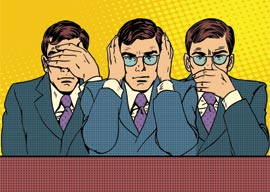
February 08, 2016

Source: Shutterstock
Every so often the leftist dogma machine will spit out a mantra so innately nonsensical that it’s hard not to scream.
The ludicrous idea that “rape has nothing to do with sex” has been drilled so diligently into the rubes’ empty, medicated heads, they’re able to look away from all those problematic penises and vaginas.
If you keep lecturing them that “race is a social construct” but that “racism” is everywhere, not only will they blindly swallow such self-contradictory idiocy, they’ll call you stupid for not dutifully playing along.
Such self-replicating slogans are not eternal truths, because the truth is required to be logically consistent. They are more like Zen koans“self-contradictory and designed to free you from logic’s oppressive shackles. They are the theoretical version of one hand clapping.
And so it goes with another meme that has become disturbingly prevalent of late”this warped, crippled idea that there’s some innate schism between “free speech” and “hate speech” and that the terms are mutually exclusive.
“Hate Speech” is Not the Same as “Free Speech” blares the idiotic headline from Daily Kos, blithely trouncing upon the very meaning of the word “free.”
We have alleged First Amendment specialists falsely claiming that “hate speech” is “unprotected by the Constitution,” even though the words “hate” and “hatred” are nowhere to be found in that document.
We have logic-immune nitwits insisting that the only way to protect “freedom of expression” is to “strengthen hate speech laws.”
We have ideological totalitarians claiming that free speech is designed only to “protect ideas worth discussing,” and that “white supremacy” is a dangerous lie that must never be told again.
We have a Canadian judge named Marshall Rothstein trying to argue with a straight face that since “hate speech…shuts down dialogue,” it must of course be shut down.
We have the editorial board of The New York Times flouting all known journalistic rules and claiming that an anti-jihadist activist is “motivated purely by hatred for Muslims,” as if they were wizards rather than journalists and have the magical power to peel beyond someone’s words to discern their evil intent.
We have one college newspaper after another specifying that free speech does not include “hate speech.”
We have 51% of Democrats and 37% of Republicans encouraging the government to criminalize “hate speech.”
And we have a robust 40% of millennials being perfectly fine with the idea that the government should prevent all speech that is “offensive to minorities.”
Statistically speaking, I’d estimate that when you’d confront any of these addled twerps and demand that they quantify intangibles such as “hate speech” and “offensiveness,” roughly 100% of them would start stuttering and scratching their heads.
It is no coincidence that those who want to ban “hate speech” also reserve the right to define exactly what this innately meaningless and entirely subjective term means.
It is no coincidence that such types dishonestly depict all dissenting political opinions as “hate.”
It is no coincidence that such types invariably worship the almighty state.
And thus it is absolutely no coincidence that the first proponents of curbing “hate speech” came from totalitarian communist regimes in the wake of WWII.
“The states where criticism of totalitarian ideology was prohibited were the ones that internationalized hate-speech laws,” writes Jacob Mchangama in a fascinating overview called “The Sordid Origin of Hate-Speech Laws”:
The [UN] voting record reveals the startling fact that the internationalization of hate-speech prohibitions in human rights law owes its existence to a number of states where both criticisms of the prevalent totalitarian ideology as well as advocacy for democracy were strictly prohibited.
The essay tracks the Soviet Union’s repeated attempts to attach hate-speech exceptions to the UN’s Universal Declaration of Human Rights and how the historical push has expanded slowly from banning speech that directly incites violence…to speech that somehow only incites “hatred”…to speech that authorities merely tag as hateful. And the Soviet Union’s definition of “hate speech” was so broad that it deemed any speech that spoke favorably of capitalism as “fascist” and therefore ban-worthy.